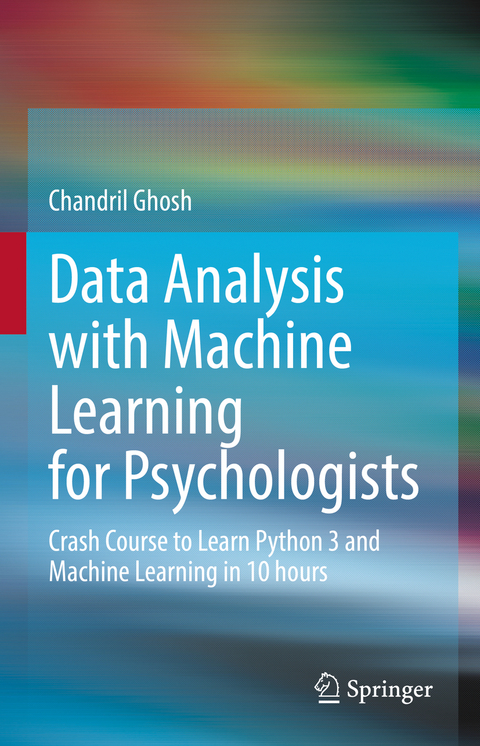
Data Analysis with Machine Learning for Psychologists
Springer International Publishing (Verlag)
978-3-031-14633-6 (ISBN)
The power of data drives the digital economy of the 21st century. It has been argued that data is as vital a resource as oil was during the industrial revolution. An upward trend in the number of research publications using machine learning in some of the top journals in combination with an increasing number of academic recruiters within psychology asking for Python knowledge from applicants indicates a growing demand for these skills in the market.
While there are plenty of books covering data science, rarely, if ever, books in the market address the need of social science students with no computer science background. They are typically written by engineers or computer scientists for people of their discipline. As a result, often such books are filled with technical jargon and examples irrelevant to psychological studies or projects. In contrast, this book was written by a psychologist in a simple, easy-to-understand way that is brief and accessible. The aim for this book was to make the learning experience on this topic as smooth as possible for psychology students/researchers with no background in programming or data science.
Completing this book will also open up an enormous amount of possibilities for quantitative researchers in psychological science, as it will enable them to explore newer types of research questions.
Dr Chandril Ghosh is a UK-based Chartered Psychologist and is currently working as a Post-Doctoral Research Associate at the University of Exeter. He completed his BSc in Psychology (honours) and MSc in Clinical Psychology from India. After completing his MSc, Ghosh began to study machine learning and python programming through books and online materials on the subject. He had no background or prior experience with coding or computer science back then. During his doctoral studies, he utilised his knowledge on the subject to employ machine learning techniques to explore psychopathology. Around the same time, he was hired multiple times to design and deliver a crash course on python 3 and machine learning for postgraduate students at the Queen's University Belfast. Furthermore, he also runs online courses on the subject outside the University, and gets students from about 56 countries. This book is a product of an accumulation of his hundreds of hours of teaching and feedback from students with social science backgrounds.
Introduction.- Step 1:Python Programming.- Step 2:Data Pre-Processing.- Step 3: Data Analysis with Machine Learning.- End Note.Python Programming.- Step 2:Data Pre-Processing.- Step 3: Data Analysis with Machine Learning.- End Note. Python Programming.- Step 2:Data Pre-Processing.- Step 3: Data Analysis with Machine Learning.- End Note. Python Programming.- Step 2:Data Pre-Processing.- Step 3: Data Analysis with Machine Learning.- End Note. Python Programming.- Step 2:Data Pre-Processing.- Step 3: Data Analysis with Machine Learning.- End Note. Python Programming.- Step 2:Data Pre-Processing.- Step 3: Data Analysis with Machine Learning.- End Note. Python Programming.- Step 2:Data Pre-Processing.- Step 3: Data Analysis with Machine Learning.- End Note. Python Programming.- Step 2:Data Pre-Processing.- Step 3: Data Analysis with Machine Learning.- End Note. Python Programming.- Step 2:Data Pre-Processing.- Step 3: Data Analysis with Machine Learning.- End Note. Python Programming.- Step 2:Data Pre-Processing.- Step 3: Data Analysis with Machine Learning.- End Note. Python Programming.- Step 2:Data Pre-Processing.- Step 3: Data Analysis with Machine Learning.- End Note. Python Programming.- Step 2:Data Pre-Processing.- Step 3: Data Analysis with Machine Learning.- End Note. Python Programming.- Step 2:Data Pre-Processing.- Step 3: Data Analysis with Machine Learning.- End Note. Python Programming.- Step 2:Data Pre-Processing.- Step 3: Data Analysis with Machine Learning.- End Note. Python Programming.- Step 2:Data Pre-Processing.- Step 3: Data Analysis with Machine Learning.- End Note. Python Programming.- Step 2:Data Pre-Processing.- Step 3: Data Analysis with Machine Learning.- End Note. Python Programming.- Step 2:Data Pre-Processing.- Step 3: Data Analysis with Machine Learning.- End Note. Python Programming.- Step 2:Data Pre-Processing.- Step 3: Data Analysis with Machine Learning.- End Note.
| Erscheinungsdatum | 19.10.2022 |
|---|---|
| Zusatzinfo | XIII, 161 p. 121 illus., 113 illus. in color. |
| Verlagsort | Cham |
| Sprache | englisch |
| Maße | 155 x 235 mm |
| Gewicht | 421 g |
| Themenwelt | Geisteswissenschaften ► Philosophie |
| Geisteswissenschaften ► Psychologie | |
| Mathematik / Informatik ► Informatik ► Theorie / Studium | |
| Schlagworte | Artificial Intelligence • Behavior • Business Analytics • Deep learning • machine learning • Python • Science |
| ISBN-10 | 3-031-14633-6 / 3031146336 |
| ISBN-13 | 978-3-031-14633-6 / 9783031146336 |
| Zustand | Neuware |
| Haben Sie eine Frage zum Produkt? |
aus dem Bereich


